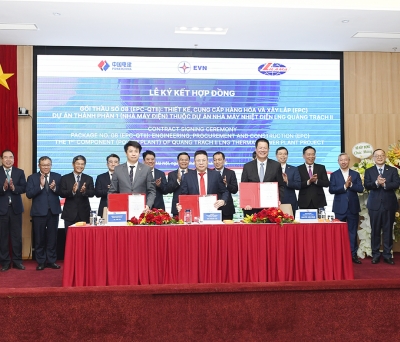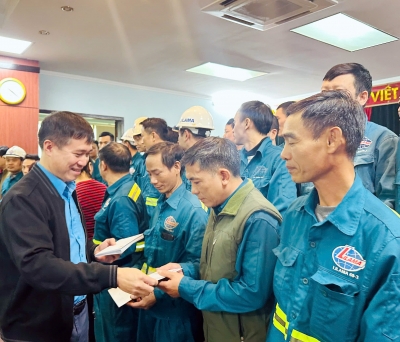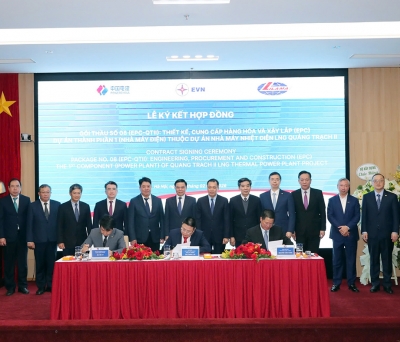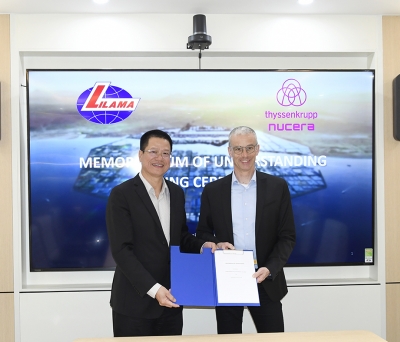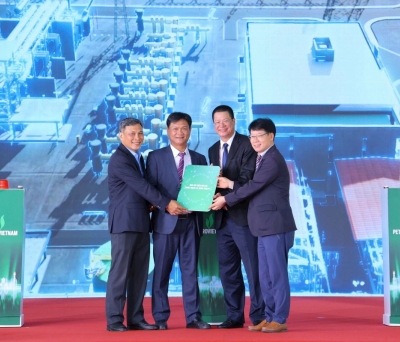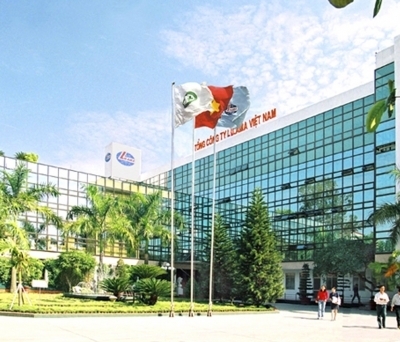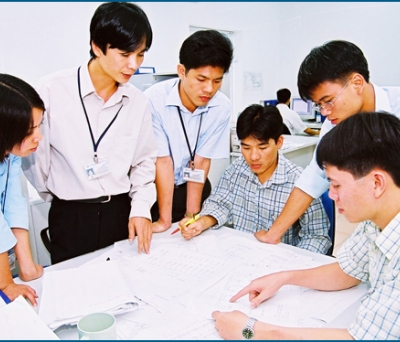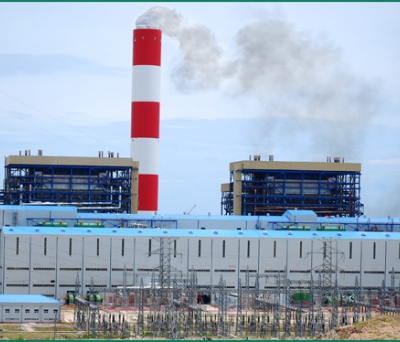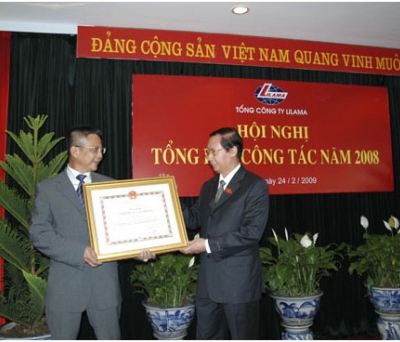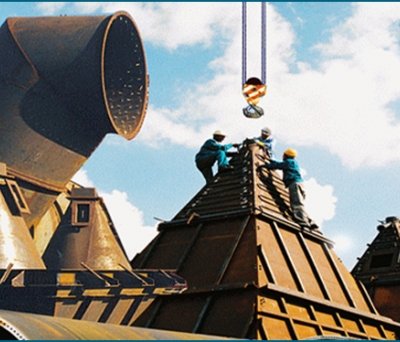Searching “core” products for manufacturing industrial branch: Last Instalment - changing the way of thinking
In the “game” of integration, markets are very wide, the notion national industry is getting “dull”, and substituted by industry of area or the world. The thought “doing all jobs and earning the whole” as before or disregarding, forsaking the processing, manufacturing field recently has made us go against the world's tendencies and failed in our strategy of industrial development. The orientation of advantaged products to invest in, participating in the global supply chain has a very important meaning. To achieve this, the prerequisite factor to be started is changing the way of thinking.
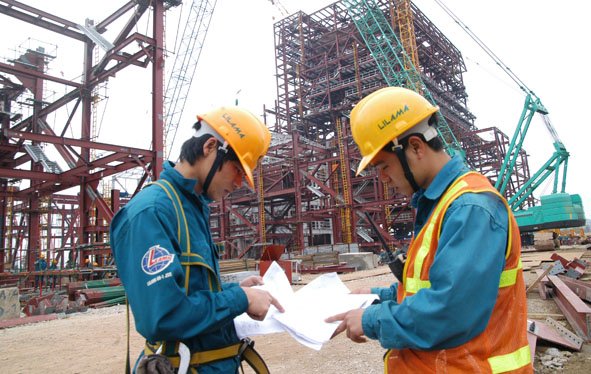
Giving preferential treatment to advantaged branch group
Industrial production is a branch requiring long-term accumulation and big investment but its rate of profits is low. For a long time, people and people flocked to “glide” securities, families and families participated to invest in real estate, etc., and the social sources were turned with tốc độ chóng mặt speed of “virtual” gains brought by these branch groups. Industrial production was neglected and became more and more backward, it was also left far from other countries in the same area. For a long period, enterprises got used to work under the form “doing all jobs and earning the whole”, all phases of production process were self-contained within their internality, laking unity and association from design, component manufacture to installation and distribution. This was a backward method of production making sources be dispersed, increasing expenses and reducing competition. For the stable and long-term development of Vietnamese industry, we should concentrate on orientation of the fields having high added values and direct or indirect contributions to our economy, reduce excess of imports and create more jobs for labourers. Doctor Tran Dinh Thien affirmed that the only way for Vietnam to become “satellite” of large corporations was to change our way of thinking, orient our strategy, we had to specialize our production, be patient to pursue our targets and turned to produce competed products.
Former Vice Prime Minister Vu Khoan said key industries had to be the ones bringing motivation and leading other economic branches to develop, creating positions and specific brand names for national products. Our national management system and economic regulations are revealing some problems. In the condition of national debts for the time being, investment in large scale projects such as airport, seaport with billions of USD is infeasible. Agriculture – aquaculture in our country make up a big percentage in economic structure, so, it is very necessary to have preferential policies to invest in processing, manufacturing industries to serve agricultural development. Experience from many developed nations has shown that their successes began from building rural economic bases firmly, then came to export industrial goods and produce commodities by themselves instead of import. At the moment, machines serving our agriculture are almost imported from foreign countries whereas in the past, domestic mechanical manufacturing factories were quite possible to supply them. Many engineers, many doctors cannot make a plough machine, raking machine, reaping – threshing machines, transplanting machine and so on for farmers but let the farmers who just graduated from school in the 3rd form grope to study and make machineries to serve themselves, it was so sad.
When our country became a “base” to manufacture high technology products of Samsung, a big chance opened up to enterprises producing components, spare parts. “The piece of cake” was in front of them, but in fact, a lot of Vietnamese businesses had not necessary capabilities to squeeze into the supply chain of Samsung. This real situation should be considered seriously. Over the past ten years, although the Government, ministries and branches have issued a series of mechanism and policies so as to speed up the development of supporting industry but “policy is on the sky and life is on the earth”. Doctor Tran Du Lich, ex member of the national assembly once said for more than 10 years since the policy of supporting industry had been discussed, the branch also had “nothing”. There were many discussions but in the end they were just documents to be kept in table drawers.
Participating in associations, avoiding waste of sources
Steel is considered important "food" of manufacturing branch. According statistics, in 2015, Vietnam imported approximately 18.75 million tons of steel among which 14.5 million tons was manufactured steel. The total turn-over of steel import was about USD 9 billion, whereas export was only USD 2 billion, so the excess of steel import reached more than USD 7 billion, the highest increase in 3 recent years. Annual import turn-over of steel is equivalent to export incomes of rice and aquatic products, seafood. Thus, construction steels are in excess but our country has not yet got any tons of steel to serve the manufacturing industry. In 20 previous years, if steel branch had concentrated to invest deeply in technology and produced manufactured steels to master the material source, we would not only have solved the problem of reducing excess of imports, but also contributed importantly to the stability and development of our economy. However, the future does not “close tight” before steel branch, there are still markets for it. If we can deploy the project of manufactured steel with capacity of 6 million tons per year, our yearly turnover will be able to achieve USD 4 billion, contributing about USD 2 billion directly or indirectly to the national GDP.
There is a situation now that many mechanical businesses misspend their workshops, machineries and equipment whereas some enterprises are not able to "own" these sources. This was the result of a series of wrong policies, a lot of investment outside the branch since many years in the past or the ability to approach markets of those businesses was not so good as the expectation or they met with numerous risks. At the same time, they had no good preparation for the attached sources, which brought about low competition and their orders were very few... On the contrary, if these equipment belonged to other units with stable output, they would be used more effectively. For the time being, to avoid waste of sources which are very limited of the nation, it is high time the State promulgated policies of arranging, transferring sources to achieve the highest effectiveness. According to Lilama General Director Le Van Tuan, if State has the policy to transfer equipment, production lines, workshops for supplement like owners' capitals, it is certainly that enterprises are ready to receive and use them more effectively because they “have the profession” and they assure the output. However, the policies should be clear and obvious so that enterprises can make their production plans proplerly.
One of the advantages of Vietnam is the cheap value of employees and population in labour age is very crowded. This is one of the important elements “attracting” orders from foreign countries. For mechanical enterprises, export orders come and go a lot due to many subjective and objective reasons. To be accepted by foreign partners, participate in global value chain, domestic businesses have to try their best continuously. Vice General Director of Lilama 18 JSC Pham Van Van let us know that for the time being approximately 20% of mechanical export of domestic factories belongs to Lilama 18 with the value of about VND400 billion per year. The company has manufactured cranes for Koch (Germany), equipment of cold steel laminating furnace for Danieli (Italy)… They are all famous firms in the world in this field. To be accepted by these partners, Lilama 18 has spent a process of “changing the look” from all production phases to caring for labourers' living standard under supervision of the partners. Although profit from mechanical export is higher than manufacture inside the country, it is still much lower than foreign mechanical companies because Lilama 18 has been paid money per tons of materials only (about USD2–4/kg) whereas others are paid per tons of equipment, i.e there is an intelligent content in the wage and the price is about USD10/kg and above.
At the moment, the policies of mobilizing & changing sources among corporations are notyet obvious. We should consider the problem on the base of national benefit with the target of maximizing effectiveness and avoiding waste of sources. If State has the policy to transfer equipment, production lines, workshops for supplement like owners' capitals, it is certainly that enterprises are ready to receive and use them more effectively because they "have the profession" and they assure the output.
LE VAN TUAN
Lilama General Director
Recently, Hoa Sen Group has had a cooperation agreement with Ninh Thuan to deploy a “super project” of steel with total investment of upto USD 10 billion, its capacity will be 16 million tons per year, however, experts in steel branch seem to be worried because the project applies common technology of high furnace and all technical specifications are so vague. So, management organs should be very careful when appraising and evaluating before approvement, avoiding the repeat of “Formosa lesson”.
(Representative of Vietnam Steel Association)
Economic journalist group - People Newspaper


